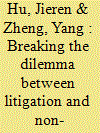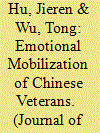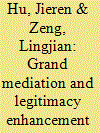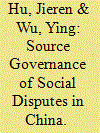|
|
|
Sort Order |
|
|
|
Items / Page
|
|
|
|
|
|
|
| Srl | Item |
| 1 |
ID:
146542


|
|
|
|
|
| Summary/Abstract |
Focusing on the dispute resolution mechanisms for defusing various social disturbances and collective incidents during the reform period and particularly in the last decade, this paper argues that the Chinese government has adopted pragmatic and problem-solving approaches to designing and developing various mechanisms of dispute resolution in response to the complicated and challenging situation of steadily increasing and intensifying social contention. There is evidence that neither litigation nor non-litigation means of dispute resolution can effectively resolve social conflicts. In light of this difficulty, various experiments have been put in place at the local level to meet social needs and manage social crises while balancing state power and social self-governance. We call such experiments “diversified mechanisms of dispute resolution (DMDR).” This study sheds light on the shift from an emphasis on the earlier non-litigation approach to a more diversified way of addressing collective disputes in contemporary China.
|
|
|
|
|
|
|
|
|
|
|
|
|
|
|
|
| 2 |
ID:
178745


|
|
|
|
|
| Summary/Abstract |
Based on in-depth interviews of Chinese veterans and specifically focusing on the cadets in Shanghai, this article explores the mechanism of emotional mobilization of this highly organized contentious group vis-à-vis other disorganized and dispersive one such as labors and homeowners. It reveals that strong emotional ties with comrades in troops and the despondency brought about by the Chinese Communist Party’s (CCP) ineffective redress to their demands have rendered Chinese veterans, who see themselves rhetorically glorified and embodying heroic status in the country, protesting for their military identity and military rank recovery for decades. In order to defuse veterans’ grievances, flexible governance, which stresses emotional care and affection by petition social workers, is deployed by the Party-state to settle disputes that beyond law and policy.
|
|
|
|
|
|
|
|
|
|
|
|
|
|
|
|
| 3 |
ID:
160456


|
|
|
|
|
| Summary/Abstract |
This article finds that the innovative practice of involving social workers in settling petition disputes in Shanghai is a kind of “flexible governance” stressing affective care and multi-pronged means of dispute resolution to relieve petition pressures and maintain social stability in the authoritarian state.
|
|
|
|
|
|
|
|
|
|
|
|
|
|
|
|
| 4 |
ID:
137363


|
|
|
|
|
| Summary/Abstract |
China has seen numerous instances of collective resistance in recent years. Suppression cannot stop popular resistance. It is also hard to solve all problems through the existing judicial system, administrative method or by social means. Based on a case study in Sichuan, this article studies the Grand Mediation (GM) mechanism in Guang'an as one of the ways in which the Chinese government chooses to build institutions and channel social grievances. GM is successful in containing social conflicts and helping the state to garner legitimacy by reducing people's hostility towards local government, which could enhance the CCP's legitimacy, whose paramount goal is to maintain political stability and social harmony.
|
|
|
|
|
|
|
|
|
|
|
|
|
|
|
|
| 5 |
ID:
186621


|
|
|
|
|
| Summary/Abstract |
A key means of consolidating the Chinese Communist Party's (CCP) ruling basis and enhancing its resilience and political leadership is to establish primary party organizations (PPOs) at the grassroots level. Drawing on the case of the Aixin Social Work Service Center in Jiangsu Province, this article interrogates the rationale and mechanism of party-building in social organizations in China. A concept of "party-building absorption of society" is raised to explore how the "red social worker" is created and trained by the party-state. Four mechanisms are found to be adopted by the CCP to build PPOs in social organizations, i.e., goal-compatibility, co-optation/exclusion, liaison, and competition. It reveals that although the CCP can turn non-government organizations (NGOs) red and reinforce social control and surveillance over them through party-building, it would reshape the state-society relations through transactional governance and may fail to realize social actors' ideological identification with the party.
|
|
|
|
|
|
|
|
|
|
|
|
|
|
|
|
| 6 |
ID:
192126


|
|
|
|
|
| Summary/Abstract |
China’s urban community is an important venue to examine the function of political discourse. Drawing on the theory of strategic action field, this article regards community as a field where officials act as incumbents, citizens as challengers, and the political discourse as an internal governance unit. The empirical data from multiple cities demonstrates that political discourses have facilitated the incumbents with several pragmatic utilities such as assuring the state’s dominance, mobilizing citizens’ participation, and disciplining residents’ regular behaviors. Meanwhile, these discourses have met the problem of ideological fatigue. Local officials’ hypocritical identification and citizens’ disguised conformity disenable the Party-state to win recognition from both citizens and officials. The findings of this article enrich the current study of political discourse with a new perspective.
|
|
|
|
|
|
|
|
|
|
|
|
|
|
|
|
| 7 |
ID:
158659


|
|
|
|
|
| Summary/Abstract |
The Chinese Communist Party faces a dilemma in local community governance, i.e. state intervention vs. community self-governance. Increased intervention violates its long-promoted social self-governance and undermines the regimes’ credibility and legitimacy, while less intervention may add to the risk of social instability and collective actions at the local level. Therefore, selective intervention is applied by local government as a rational choice in community governance. This article explores the political rationale of local governments’ selective intervention in community disputes in urban China. The authors argue that the type of community, the degree of homeowners’ solidarity and the media exposure significantly affect the likelihood and degree of a local state’s intervention as well as the local government’s response in the dispute resolution.
|
|
|
|
|
|
|
|
|
|
|
|
|
|
|
|
| 8 |
ID:
193132


|
|
|
|
|
| Summary/Abstract |
This article examines the features and limits of a new dispute resolution mechanism implemented by Chinese courts called, “Source Governance of Social Disputes” (SGSD). Differing from existing extralegal means of dispute resolution, SGSD aims to bring courts back to the center of dispute resolution by pre-emptively intervening in dispute-prone processes via technology-based mechanisms. However, this has generated two pitfalls. Although preemptive repression can be adopted by deploying digital technologies to impose mediation on people and persuade them to make compromises, such technological deployment by and large fails to resolve the root causes of social disputes. Additionally, SGSD introduces new risks of technological abuse which may coerce litigants to accept mediation instead of adjudication, causing an erosion of public confidence in the Chinese legal system and a weakening of regime legitimacy.
|
|
|
|
|
|
|
|
|
|
|
|
|
|
|
|
|
|
|
|
|